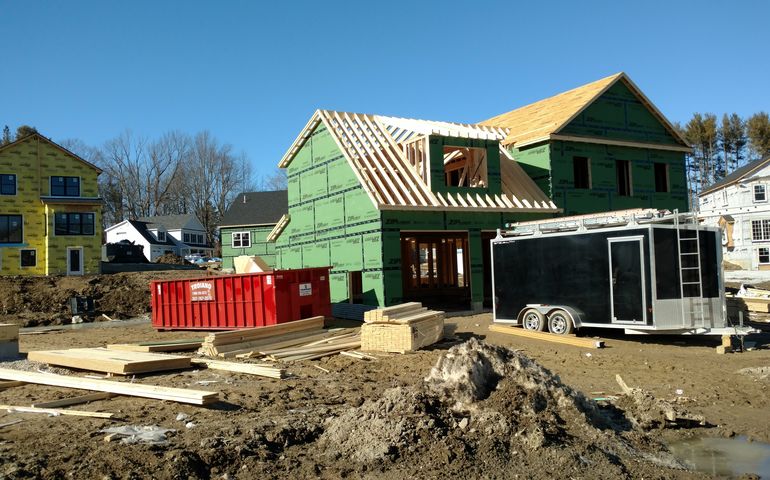Falmouth mulls building cap change as Cumberland County towns hit growth limits
 Photo / William Hall
The town of Falmouth, where homes like these off Gray Road are sprouting up, will consider changes to its growth cap ordinance at a special public discussion Monday night.
Photo / William Hall
The town of Falmouth, where homes like these off Gray Road are sprouting up, will consider changes to its growth cap ordinance at a special public discussion Monday night.
The town of Falmouth, where the population has surged over 10% since 2010, on Monday night could begin considering possible changes to its ordinance limiting housing construction. The town is one of several in southern Maine that are watching their numbers of new home builds with concern.
Falmouth’s rate-of-growth ordinance, which was created in 2000 to prevent unchecked development, now limits the number of building permits issued for single and two-family homes to a total of 65 annually.
But four months into 2021, the town is already poised to hit the cap.
Since Jan. 1, 57 permits have gone out to one- and two-family projects in Falmouth, with another eight permits expected to be issued this month, according to an April 15 memo from the town’s community development director, Ethan Croce. As of that date, the town had received 72 permit applications for one- and two-family homes.
Falmouth has maxed out previously, but never so early in the year. In 2020, the town issued its 65th permit on Oct. 28, according to the memo. In 2018, the town hit the limit on Dec. 17.
The Portland suburb has a population of over 12,300, according to the most recent census data, comprising 4,727 households.
“In light of the pace with which the town has issued its annual allocation of permits, the [Town] Council would like to have a discussion and special public comment opportunity regarding the rate of growth ordinance,” the agenda for Monday night’s Falmouth Town Council meeting reads.
A tip of the cap
Back in 2000, Falmouth’s growth cap ordinance limited the number of permits for single-family home construction to 100 per year. Since then, the rule has become stricter — and more complex.
In addition to the maximum of 65 annual permits for one- and two-family homes, the current ordinance caps permits for multifamily dwellings at 24 and accessory units at 20. There’s a smaller cap for projects in Rural Residential District zones. And there’s an exemption on the cap for senior housing.
State law also determines how much Falmouth and other communities can limit home building. If a municipality chooses to establish a cap, Maine requires it to allow permits equal to at least 105% of the average number of permits granted annually over the previous 10 years. Affordable housing permits must represent at least 10% of that number.
In addition, municipalities are required to review their growth caps every three years. Falmouth last reviewed its ordinance in 2019, and so doesn’t have to consider a change until next year.
Meanwhile, other towns in Cumberland County are also monitoring the numbers of their home-building permits.
Windham last July adopted an annual growth cap of 100 residential units. But the town anticipates hitting that number by mid-year, according to Croce.
Scarborough has a cap of 135 units per year, but maxed out in January and currently has a waiting list of several dozen projects looking for permits. Cumberland limits new home permits to 65 a year, but by March had already issued 35 of them.
In the surrounding area, however, many municipalities don’t have any limit. Among the uncapped communities are Gorham, Freeport, Portland, South Portland, Yarmouth and Westbrook.
In Falmouth, Croce said the 2021’s record permitting may be an “anomaly.” Still, he cautioned, “it is always impossible to predict when new developments may be proposed and similarly impossible to predict how quickly property owners in any new development will apply for building permits.”
The Falmouth Town Council meets virtually at 7 p.m. Monday, and access information and the agenda can be found here.
Mainebiz web partners
This is not the way to go. The problem is with Maine's existing housing stock. It is old and highly energy inefficient. Nearly all Maine homes burn heating oil, of which is the worst thing to use for heating a home. Only allow building of new homes that have a negligible carbon footprint, and that is a good start.










1 Comments